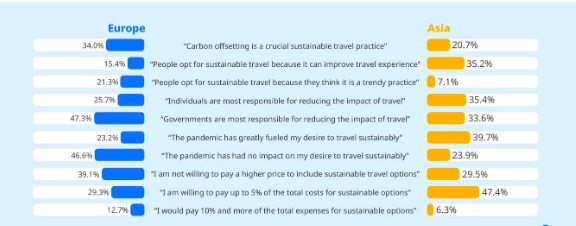IDENTIFY OPPORTUNITIES FOR THE TRAVEL INDUSTRY
Trip.com Group, a leading global travel service provider, today released its inaugural “Sustainable Travel Consumer Report 2022”, celebrating World Tourism Day. The report sheds light on the increased acceptance of sustainable travel and its implications for the travel industry and the wider world. Across the globe, sustainable travel — both in theory and practice — has moved from the back of travellers’ minds to the forefront of the decision-making process, with more than 68% of respondents in Singapore and 90% of respondents in Thailand acknowledging its importance.
Sustainable Travel an Increasingly Accepted Idea
Based on a survey of 7,705 respondents across 11 markets in Asia and Europe, the report finds that the impact of travel has topped the list of reasons why travellers are increasingly drawn to sustainable travel. Of the population surveyed, 69.3% of Singapore and 60.4% of Thailand respondents said they care about the impact of travel on future generations. 16.2% in Singapore and 24.6% in Thailand cited the importance of sustainability in improving the travel experience, and another 6.2% in both countries perceived it as trendy. Perception of sustainable travel varies among respondents. The report indicates a growing proportion of travellers now approach the term more holistically, emphasising the economic, cultural and biodiversity aspects in addition to the more traditional environmental considerations. The more diversified understanding of sustainable travel manifests itself through several ways that travellers consider conducive to tourist destinations, with 39.4% of respondents from Singapore recognising the benefit of supporting local businesses and livelihoods. A striking 44.7% believe respecting the culture and heritage of local destinations is also part and parcel of sustainable travel.
The Rising Awareness of Sustainable Travel
The pandemic is a key driver of a stronger collective desire to travel sustainably resulting from shifts in consumer mindset and behaviour. The report point s out that over half of respondents in both Singapore (63%) and Thailand (78.5%) named COVID-19 as a catalyst for their increased appetite to choose sustainable options. Travel restrictions enhanced their appreciation for nature and spurred demand for travelling closer to home. One of the highlights of the report is the insight it offers into how Asian and European travellers understand and practise sustainable travel differently. Notably, 21.3% of Europe-based respondents stated that people opt for sustainable travel because “it is trendy”, while the proportion of Asian travellers who took this view is much smaller, at 7.1%.

They also differed in their attitudes towards paying a higher price for sustainable options, with 39.1% of European travellers reluctant to pay extra for them, compared to 29.5% among their Asian counterparts.
Despite the regional disparities, however, it is clear from the report that more and more people are engaging in various forms of sustainable travel practices. Amid heightened sustainability awareness, more than half (59.2%) of respondents demonstrate an inclination to pay a higher price for carbon offsetting to reduce the impact of their travel.
A significant opportunity for OTAs
Notwithstanding a spike in the popularity of sustainable travel, only 20% of respondents didn’t report any barrier to sustainable travel, while the rest encountered various obstacles. Inadequate visibility of sustainable options poses a significant barrier to their wider adoption. Travellers blame this on the difficulty of accessing information about sustainable travel products, with 21.6% in Singapore and 39.7% in Thailand stating there is a lack of sustainable options and 18.3% in Singapore and over half of the Thai respondents (50.7%) saying these are not clearly labelled. Accordingly, over 50% of Singapore (59%) and Thailand (57.3%) respondents believe Online Travel Agencies (OTAs) should clearly label sustainable options, followed by 53.6% of Singapore respondents and 43.6% of Thailand respondents who call ed upon OTAs to make it easier to find these options. Over 70% of respondents from Singapore also suggested OTAs offer incentives to encourage sustainable travel.
While approximately half of the travellers in both Singapore and Thailand are open to paying more to include sustainable options in their trips, they display varying levels of price sensitivity to the higher costs it usually entails, with only around 0.5% of Singapore respondents and 7.2% of Thailand respondents willing to pay over 10% of the total price for a sustainable option. Against this backdrop, online travel agencies and booking platforms have a significant opportunity to tap into this by showcasing their sustainable travel credentials and endearing themselves to like-minded users. The report shows that an overwhelming 93.0% of respondents would consider booking via OTAs that provide sustainable options.
Jane Sun, CEO of Trip.com Group, said: “The results reaffirm our vision to educate travellers better and provide a greater volume and variety of reliable, sustainable travel options. Our findings are a clarion call to ourselves as to our allies in the travel sector. In the future, we will join hands with partners, travellers and other stakeholders to venture towards a more sustainable world.”
Green Trip Challenge
As sustainable travel takes hold among online travel agencies and travellers, travel platforms are leveraging social media and other channels to engage with users, encouraging them to practise sustainable travel during their trips and in doing so, rethink and rediscover its meaning and benefits, especially in the context of the pandemic.






